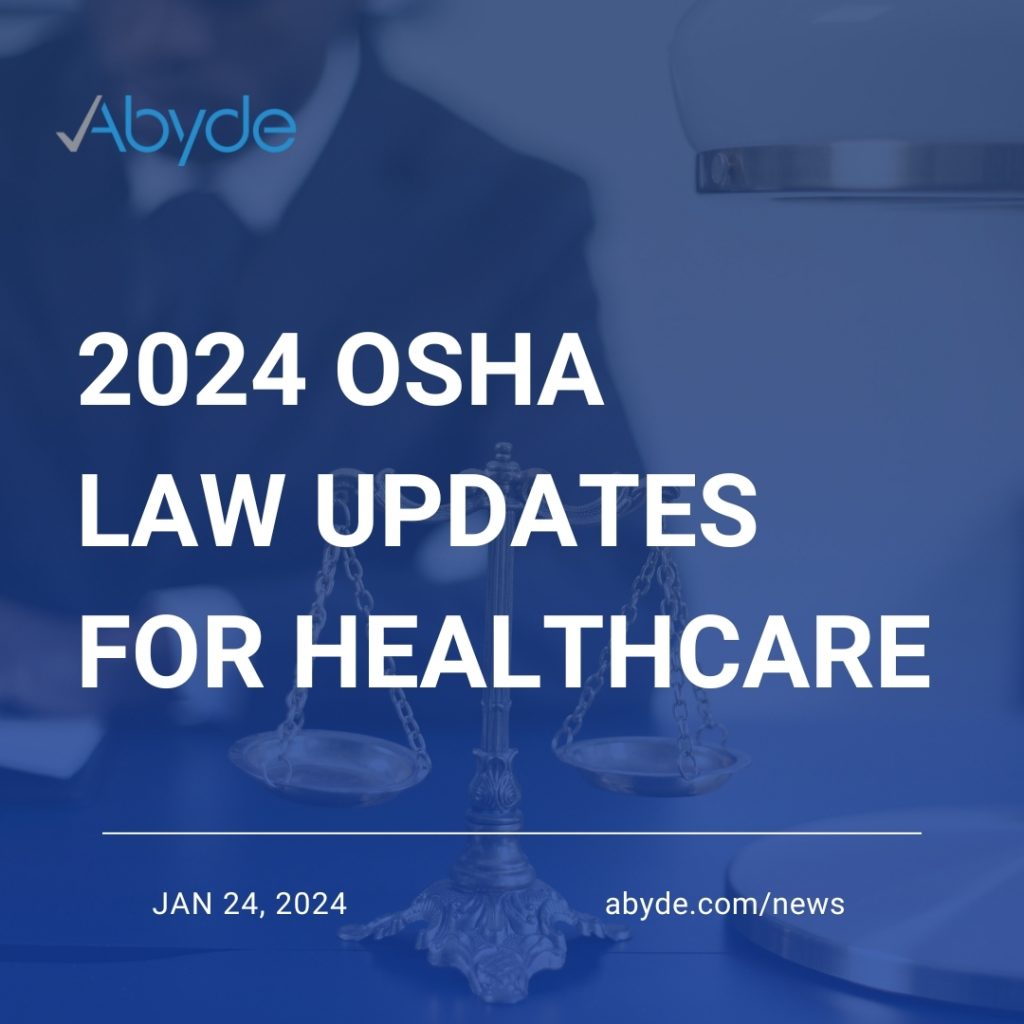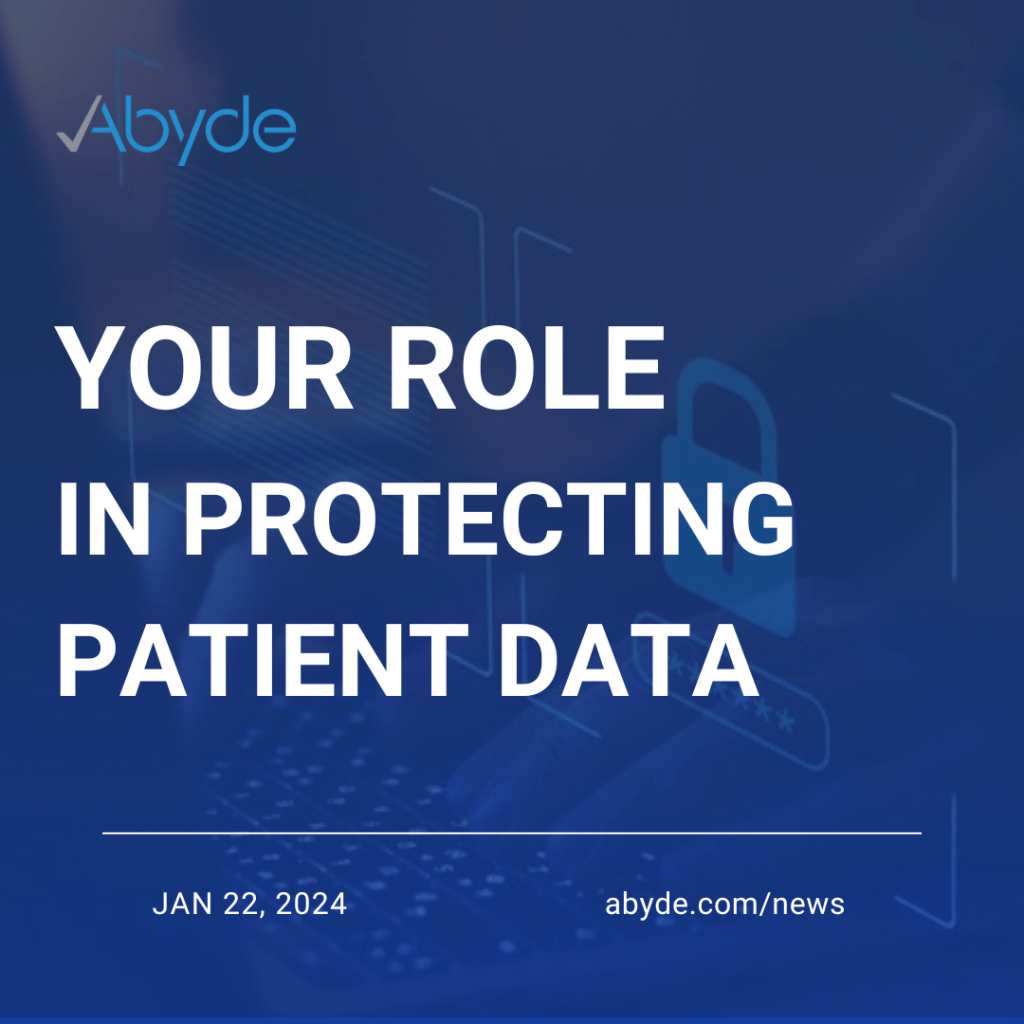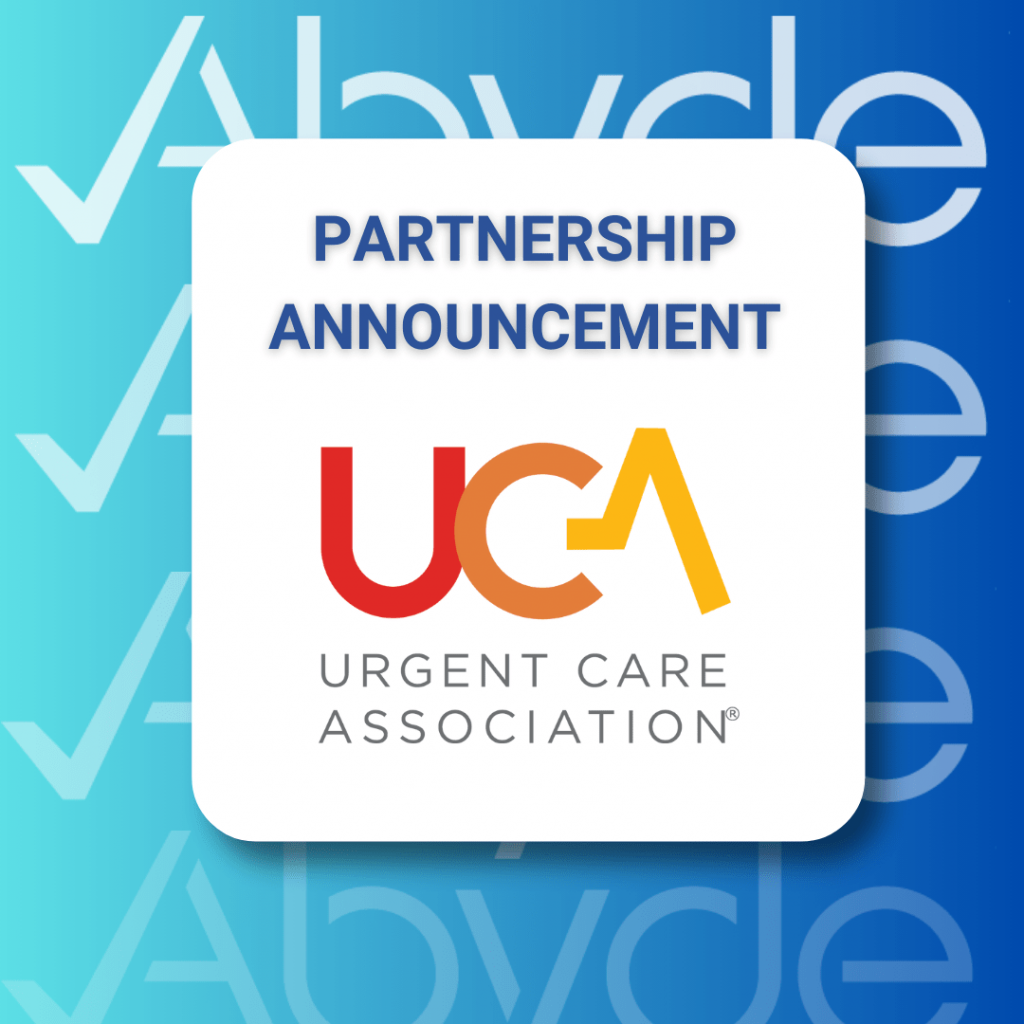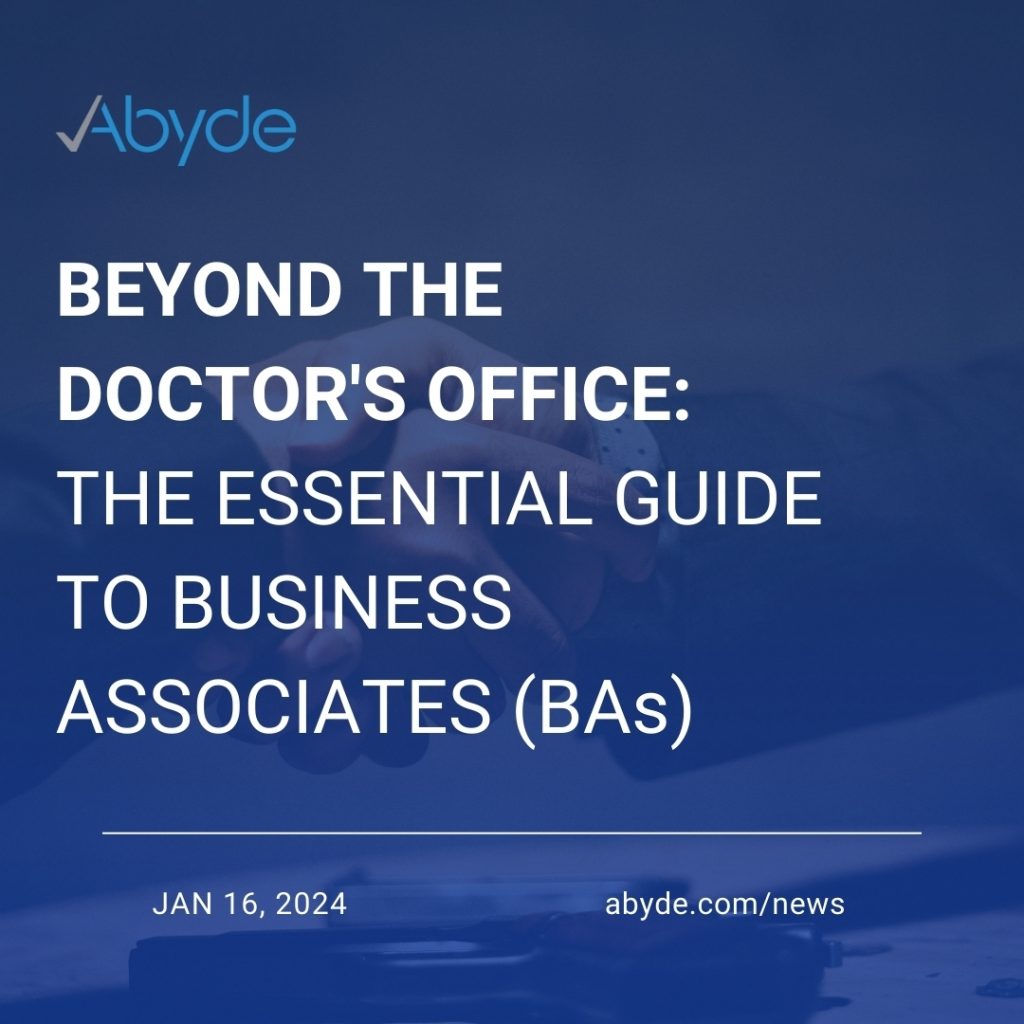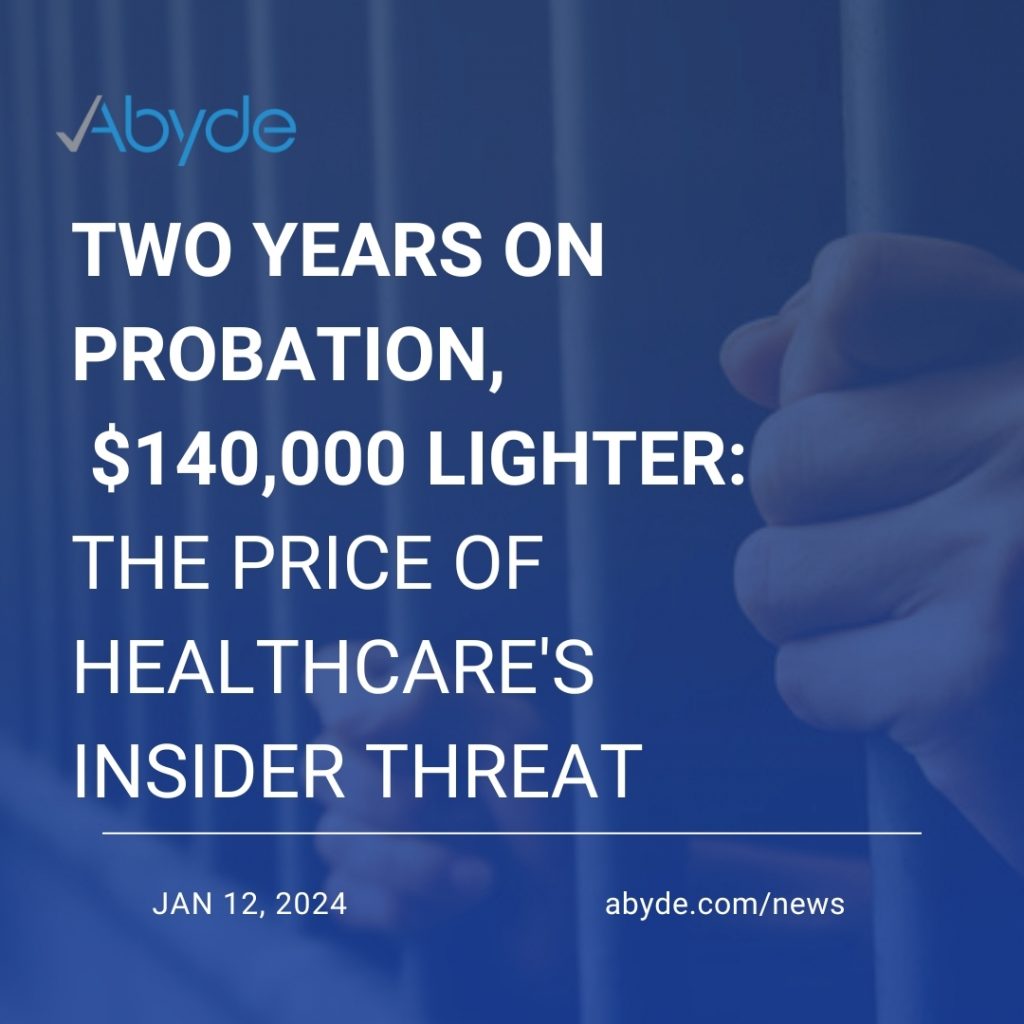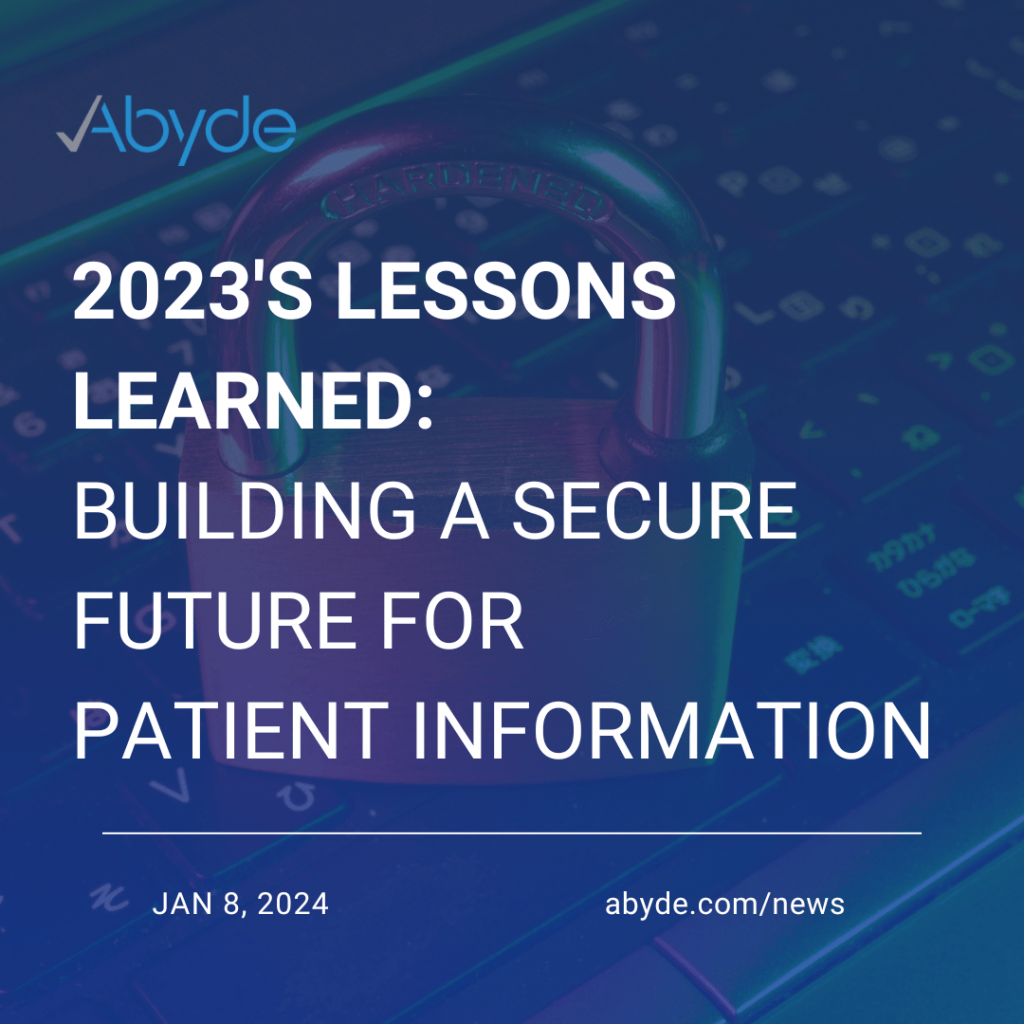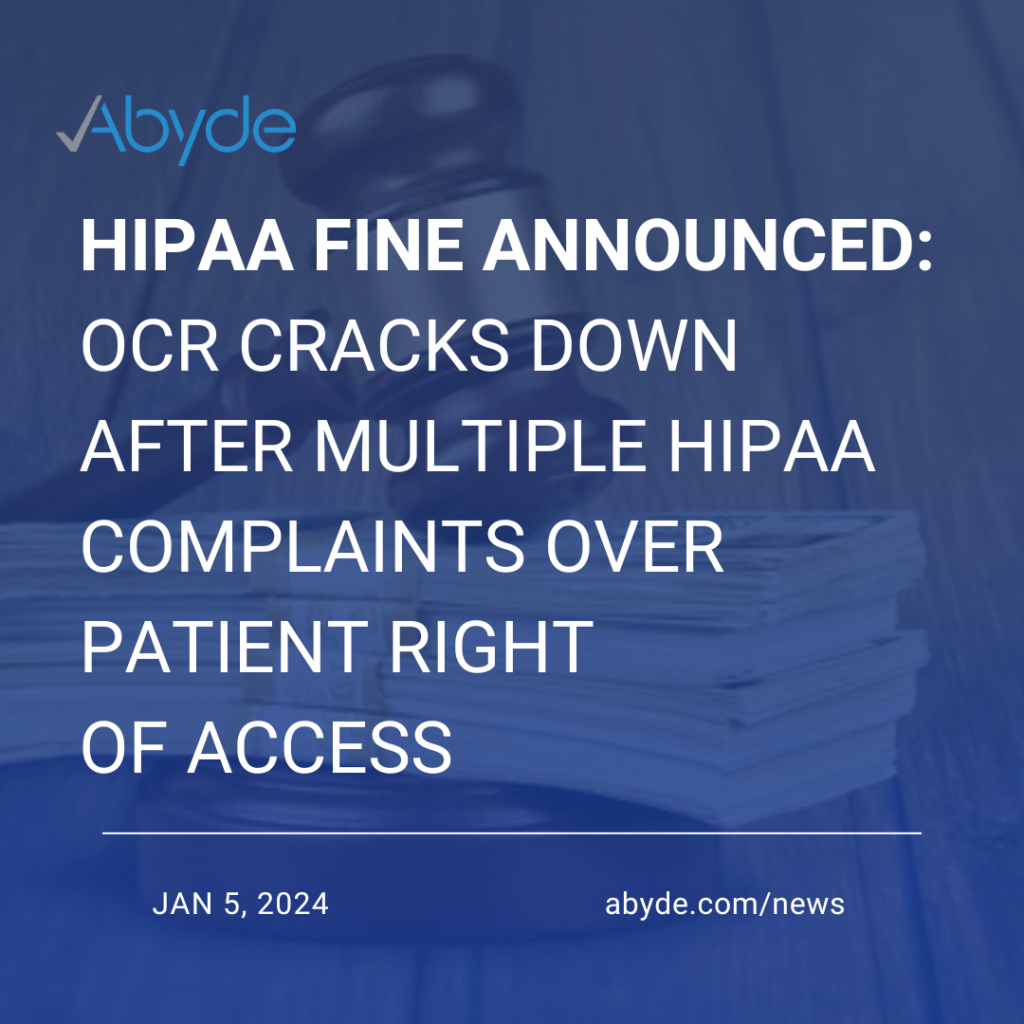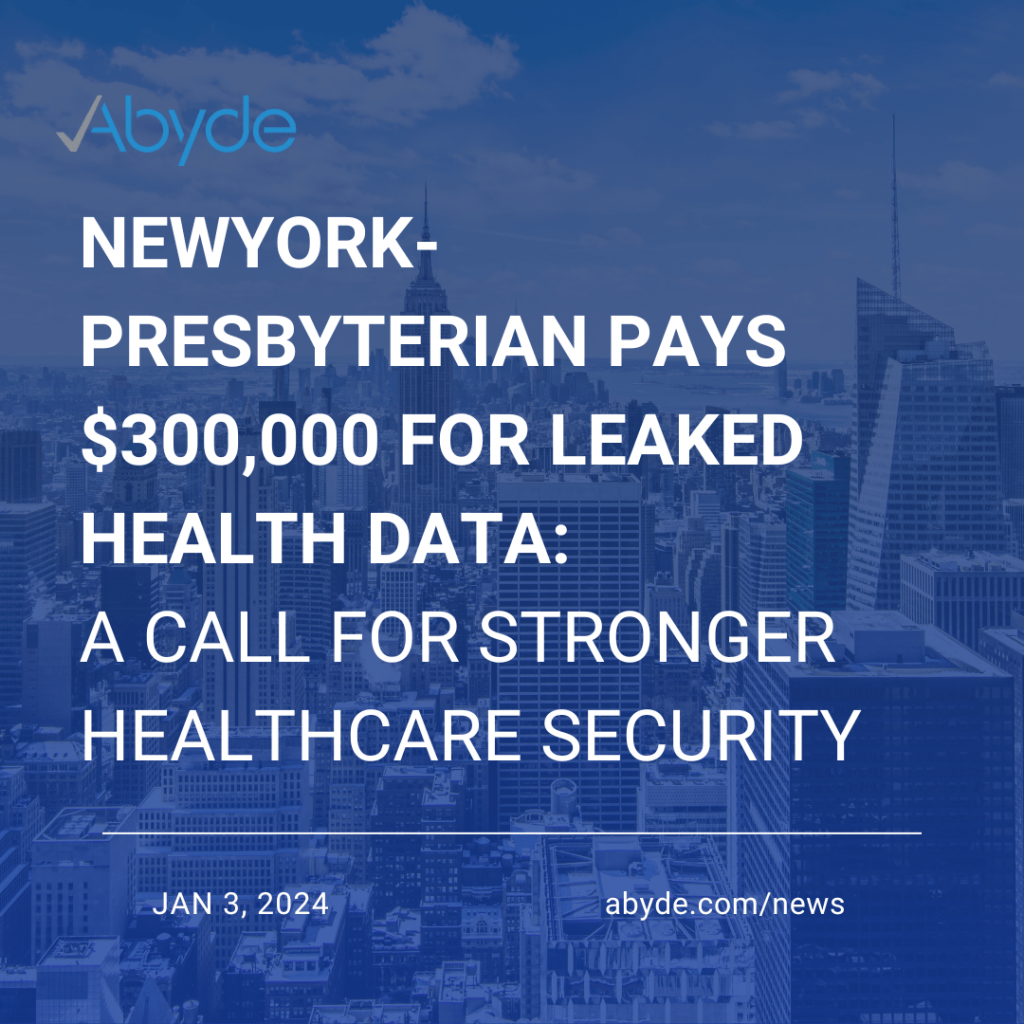January 26, 2024 At Abyde, we know that the medical world isn’t all scalpels and stethoscopes. It’s a whirlwind of paperwork, regulations, and let’s remember, actual patients needing top-notch care. That’s where trusty Business Associates (BAs) step in, taking care of billing, document disposal, IT services, and more, ensuring that medical staff can focus on patients. But even reliable Business Associates need to find the right medical Sub-Business Associates. Unsure what that entails? Don’t worry, Abyde has you covered! By seeking the right skills and qualities in Sub-Business Associates, and nurturing a supportive work environment, you can build a powerful team that elevates your organization to new heights. A reliable and skilled Sub-Business Associate is an investment in your success, ensuring the smooth operation and exceptional care that defines your commitment to patients. If you want to learn more about choosing the right sub-business associates, email us at info@abyde.com and schedule a consultation here.
2024 OSHA Law Updates for Healthcare
January 24, 2024 Greetings, safety champions! At Abyde, we’re obsessed with keeping workplaces hazard-free, which means staying on top of regulatory shifts like OSHA’s 2024 updates. So, grab your safety goggles and buckle up, because we’re about to unpack the need-to-know changes that impact your business. Electronic Injury Reporting Changes: OSHA is now requiring electronic injury reporting of Form 300 – Log of Work-Related Injuries and Illnesses, and Form 301 – Injury and Illness Incident Report for high-hazard industries with 100+ employees on a yearly basis. The Form 300A – Summary of Work-Related Injuries and Illnesses still also needs to be completed. In addition, all companies have to use their legal company names while filing these electronic reports to improve the quality of OSHA’s data. Increased Penalty Fines OSHA is throwing some serious punches when it comes to violations. As of January 16th, all OSHA’s maximum penalties increased from $15,625 per violation to $16,131 per violation. The maximum penalty for repeated violations will increase from $156,259 per violation to $161,323 per violation. Now, that’s one costly mistake! Changes to Hazard Communication Standard Last updated in 2012, It is expected that OSHA will finalize updates to the Hazard Communication Standard. The new HCS will align with the latest edition of the Globally Harmonized System of Classification and Labeling of Chemicals (GHS). This means a shift in how we categorize chemical dangers, with new hazard classes and pictograms potentially finding their way onto labels and Safety Data Sheets (SDSs). Championing Compliance with Abyde At Abyde, we’re your compliance crew, cheering you on every step of the way. We’ve got a toolbox full of resources to help you understand and promote a culture of compliance in your practice. For more information on how your organization can simplify OSHA compliance for your practice, email info@abyde.com or set up an compliance consultation here.
Your Role in Protecting Patient Data
January 22, 2024 In the intricate healthcare ecosystem, patient data flows through a network of entities, each holding a piece of the puzzle. At the core are covered entities, like hospitals, clinics, and health plans, directly responsible for patient care and managing their Protected Health Information (PHI). Alongside them stand business associates, vendors and service providers who handle PHI on their behalf, performing crucial tasks like billing, claims processing, and data analytics. Both covered entities and business associates share a critical responsibility: safeguarding patient data with utmost vigilance. Breaches or misuse of this sensitive information can have severe consequences, eroding trust, damaging reputations, and potentially harming patients. So what exactly constitutes your role in this collective effort, depending on your position within the system? Unpacking the Roles: Sharing the Responsibility: Some vital roles Covered Entities and Business Associates play in data security include: Shared Accountability, Shared Success: Protecting patient data is a team effort. Covered entities and business associates must work together, hand-in-hand, to build a robust security ecosystem. This requires: Compliance is not just a box to tick; it’s a shared commitment to safeguard patient trust and privacy. By understanding their roles and responsibilities, both covered entities and business associates can lead as protectors of patients’ sensitive information. For more information on how you can ensure compliance, contact us at info@abyde.com and schedule an educational consultation here.
Abyde and Urgent Care Association Partner to Streamline Compliance for Independent Urgent Care Practices Nationwide
January 19, 2024 CLEARWATER, FLORIDA, UNITED STATES, January 19, 2024 /EINPresswire.com/ – Abyde, the leading provider of cloud-based compliance solutions for healthcare, has joined the Urgent Care Association (UCA) —the national trade association for the Urgent Care industry —to further its reach and impact on streamlined compliance resources for independent Urgent Care practices across the United States. This collaboration addresses the growing complexity of regulations impacting urgent care, providing practices with the tools and expert guidance needed to navigate HIPAA, OSHA, and other critical compliance requirements. Through Abyde’s user-friendly software platform and UCA’s industry-leading expertise, urgent care providers can: “At Abyde, we’re passionate about making compliance simple and accessible for all healthcare providers,” said Matt DiBlasi, CEO at Abyde. “This partnership with UCA gives independent urgent care practices the tools and support they need to thrive in a complex regulatory environment.” “UCA is happy to welcome Abyde as a Corporate Member of the association. We appreciate their commitment to empowering our members with the resources they need to succeed,” Jackie Stasch, Director of Corporate Strategy and Events, said. This new Abyde venture represents a significant step forward in simplifying compliance for the Urgent Care industry. Between Abyde’s innovative technology and UCA’s deep understanding of the Urgent Care landscape, Urgent Care practices can feel confident and supported in navigating the ever-changing regulatory landscape and focus on delivering exceptional patient care. About Abyde Abyde is a leading provider of cloud-based compliance solutions for healthcare. Its award-winning platform simplifies and automates compliance tasks, helping healthcare providers reduce administrative burdens, stay ahead of regulations, and protect patient data. Abyde serves thousands of healthcare organizations across the country, including hospitals, clinics, and physician practices. About the Urgent Care Association The Urgent Care Association (UCA) is the trade association for Urgent Care, with a membership of more than 4,000 Urgent Care centers representing clinical and business professionals from the United States and abroad. For more information: Abyde: https://abyde.com/ Urgent Care Association: https://urgentcareassociation.org/ Media Contact: Penelope Schweitzer, Creative Project and Content Lead pschweitzer@abyde.com
Beyond the Doctor’s Office: The Essential Guide to Business Associates (BAs)
January 16, 2024 In the healthcare world, data privacy reigns supreme. That’s where the Health Insurance Portability and Accountability Act (HIPAA) comes in, safeguarding sensitive patient information known as protected health information (PHI). But HIPAA’s reach extends beyond hospitals and doctors’ offices. Enter the business associate (BA): a vital player in the healthcare ecosystem, yet often shrouded in mystery. So, who exactly are BAs? Imagine a bustling healthcare landscape. Hospitals outsource billing services to companies, pharmacies rely on data analytics firms, and insurers partner with cloud storage providers. All these entities, if handling PHI, become BAs under HIPAA. In simpler terms, a BA is any person or organization that performs certain functions or activities involving PHI on behalf of a covered entity (healthcare providers, health plans, and clearinghouses). BAs sometimes are field-specific, like optometrists having eyeglass labs and OCT manufacturers. Dentists also have BAs like dental labs and equipment providers. Think of BAs as the supporting cast in the HIPAA play. They handle crucial tasks behind the scenes, ensuring smooth healthcare operations while keeping patient data secure. But with great responsibility comes great accountability. BAs are bound by the same HIPAA regulations as covered entities, meaning they must: Why are BAs important? BAs play a critical role in the healthcare industry’s efficiency and innovation. They allow covered entities to focus on patient care while outsourcing non-core activities. But more importantly, BAs contribute to a robust system of PHI protection, ensuring patient privacy and trust. The BA landscape is constantly evolving. With the rise of telehealth and cloud computing, new types of BAs are emerging. This highlights the need for ongoing education and awareness about BA responsibilities to maintain robust HIPAA compliance across the healthcare spectrum. Remember: Whether you’re a seasoned healthcare professional or a curious outsider, understanding BAs is crucial for navigating the complex world of HIPAA. By demystifying their role and responsibilities, we can work together to build a stronger, more secure healthcare system for everyone. So next time you hear the term “BA”, remember: they’re not just business associates; they’re essential allies in safeguarding patient privacy and ensuring a healthy future for HIPAA compliance. If you have any other questions on business associates, email us at info@abyde.com, or set up an educational consultation with one of our compliance experts.
Two Years on Probation, $140,000 Lighter: The Price of Healthcare’s Insider Threat
January 12, 2024 Two Years on Probation, $140,000 Lighter: The Price of Healthcare’s Insider Threat A former healthcare executive in Kentucky has been sentenced to probation and ordered to pay restitution after admitting to disclosing patients’ protected health information (PHI) in violation of HIPAA. This case highlights the ongoing threat of insider data breaches in the healthcare industry and the importance of strong data security measures. The Case: Mark Kevin Robison, a former vice president at Commonwealth Health Corporation (now Med Center Health), pleaded guilty to knowingly disclosing PHI of patients under false pretenses to an unauthorized third party between 2014 and 2015. While details of the unauthorized disclosure remain unclear, the incident underscores the potential harm caused by insider data breaches within healthcare organizations. Avoiding Jail, Facing Consequences: Despite facing a potential five-year prison sentence and a $100,000 fine, Robison’s plea deal secured him two years of probation and a $140,000 restitution to the hospital. Half of the restitution has already been paid, and Robison is expected to cover the remaining amount by the end of January. Lessons Learned: The Robison case serves as a stark reminder of the importance of data security in healthcare. Healthcare organizations must: Insider Threats Remain a Challenge: While HIPAA violations by external hackers often grab headlines, insider threats like the Robison case pose a significant and often underestimated risk. Healthcare organizations must prioritize data security measures that take into account both external and internal threats. Looking Ahead: This case should serve as a wake-up call for healthcare organizations to redouble their efforts to protect patient data. By prioritizing data security and creating a culture of compliance, healthcare providers can help ensure that patients’ personal information remains safe and secure. To learn more on how to ensure your practice is compliant, email info@abyde.com and schedule an educational consultation.
From Myth to Mastery: Crafting a Roadmap for Effective Multi-Location Compliance
January 10, 2024 For healthcare organizations juggling multiple locations, HIPAA compliance can feel like a labyrinth. It’s tempting to assume that centralized policies and procedures for one location ensure the whole house is in order. But beware, dear multi-location giants, that assumption can land you in hot HIPAA water! Here are some common misconceptions that can trip up even the most well-intentioned multi-location practice: Myth #1: One Size Fits All for Compliance: Just because your flagship location aces HIPAA audits doesn’t mean the same magic extends to every branch. Each location is a separate entity in the eyes of regulators, and each must have its tailor-made compliance program. This means location-specific risk assessments, policies, and training, not a one-size-fits-all blanket draped over your entire network. Myth #2: Centralized Servers, Centralized Compliance: Sharing patient data across a central server might seem like a compliance shortcut, but it’s a gamble. HIPAA requires reasonable safeguards at every point of protected health information (PHI) storage, use, and transmission. So, even if your central server is Fort Knox-level secure, if a local laptop holding PHI lacks basic encryption, you’re vulnerable. Myth #3: Training Once, Compliant Forever: HIPAA isn’t a one-and-done deal. Staff across all locations need ongoing training to stay up-to-date on evolving regulations and internal practices. Regular refreshers and location-specific training on local procedures are crucial to keeping everyone on the same HIPAA hymn sheet. Myth #4: Breaches Happen Elsewhere: Don’t fall into the trap of thinking data breaches only happen to the other guys. Every location is a potential target, and each must have its own breach response plan, including timely notification protocols and clear communication channels. Remember, ignorance is not bliss when it comes to HIPAA violations. The Multi-Location Advantage: While navigating HIPAA across multiple locations can seem daunting, remember, that size can be your ally. Strong central oversight coupled with empowered local compliance champions can create a robust network of informed and proactive defenders of patient privacy. Invest in technology, like Abyde, that centralizes documentation and streamlines compliance tasks, making it easier for each location to stay on top of its game. The Bottom Line: Multi-location practices, remember, HIPAA compliance is not a game of chance. It’s a strategic necessity. By ditching the common misconceptions and embracing location-specific, proactive compliance initiatives, you can safeguard patient data, avoid costly fines, and build trust with your patients across every branch of your healthcare tree. So, step out of the compliance maze and shine a light on each location – your patients, your business, and your peace of mind will thank you for it. Want To Separate Myth vs Reality in Your Own HIPAA Compliance? TAKE THE HIPAA CHALLENGE
2023’s Lessons Learned: Building a Secure Future for Patient Information
January 8, 2024 The year 2023 marked a turning point in healthcare data privacy. HIPAA compliance took center stage, with both the Office for Civil Rights (OCR) and state Attorneys General flexing their muscles and delivering hefty settlements for violations. This surge in enforcement activity sends a clear message: protecting patient data is crucial and required for practices. Ransomware reared its ugly head, leaving a trail of exposed records and compromised privacy. OCR’s first-ever settlement for a cyberattack, involving over 200,000 individuals impacted by Doctors’ Management Services, and costing the organization a $100,000 fine. This highlights the growing threat of malware and the need for robust cybersecurity measures. Investigations also revealed systemic vulnerabilities in security practices, risk analysis, and incident response, exposing crucial areas for improvement. Financial penalties skyrocketed in 2023, reflecting a zero-tolerance stance towards HIPAA non-compliance. From LA Care’s $1.3 million settlement for inadequate security to St. Joseph’s Medical Center’s $100,000 fine for unauthorized PHI disclosure, we see that violations come with a steep price tag. Hacking remained the primary culprit of breaches. Over 77% of the large breaches reported to OCR were due to hacking. In addition, the large breaches reported this year have affected over 88 million individuals, an increase of over 60% compared to 2022. This alarming trend underscores the urgency of prioritizing patient data protection and implementing robust cybersecurity solutions. The year 2023 also saw a stark reminder that safeguarding patient information extends beyond digital security. The Kaiser Foundation Health Plan’s $49 million settlement, while not directly fined by the OCR, but the State Attorney General of California, served as a cautionary tale. The case centered on the organization’s improper disposal of PHI and hazardous waste in dumpsters, exposing sensitive information and potentially harmful materials to anyone who stumbled upon them. This incident highlights the critical need for comprehensive data governance policies encompassing not just digital security protocols but also physical procedures for secure storage, transportation, and disposal of any materials containing PHI. While the statistics paint a grim picture, they also present an opportunity for positive change. Abyde, a leading provider of compliance software, believes this heightened awareness can be a catalyst for improvement. By embracing comprehensive and intuitive compliance solutions, enforcing policies and procedures and fostering a culture of compliance in your practice or organization, we can ensure patients’ data is safe. 2023 may have been a year of reckoning for HIPAA compliance, but it will be the foundation of a secure 2024. Let’s work together to prioritize patient privacy, strengthen security and overall, promote a culture of compliance, to keep patients safe. Contact Abyde today at info@abyde.com or set up a demo to see how our compliance software will keep your practice and patients safe this new year.
HIPAA Fine Announced: OCR Cracks Down After Multiple HIPAA Complaints Over Patient Right of Access
January 5, 2024 Patients at Optum Medical Care in New Jersey and Connecticut had a frustrating experience: waiting months for their medical records. They requested their records, as guaranteed by the Health Insurance Portability and Accountability Act (HIPAA), but Optum dragged its feet for months, far beyond the 30-day legal limit. Fed up with the delays, several patients filed complaints with the Office for Civil Rights (OCR). The OCR investigated and found that Optum had indeed violated the law. As a consequence, Optum has been slapped with a $160,000 fine and ordered to implement a corrective action plan to speed up the record-sharing process. This case is a reminder of two important things: This case is also the 46th enforcement action taken by the OCR under its Right of Access Initiative, highlighting the importance of timely access to medical records for patients across the country. Abyde: Your Partner in HIPAA Compliance At Abyde, we recognize the stress practices undergo trying to stay in compliance. We remain committed to supporting practices in navigating the complexities of HIPAA compliance, with a specific emphasis on the importance of providing patients medical records within the allotted time frame. Contact Abyde today at info@abyde.com and set up a demo to see why Abyde is considered the pre-eminent HIPAA compliance solution.
NewYork-Presbyterian Pays $300,000 for Leaked Health Data: A Call for Stronger Healthcare Security
January 3, 2024 At Abyde, we’re always tuned into the importance of keeping health info safe and sound. So, when we heard about what happened at NewYork-Presbyterian Hospital (NYP), you can bet we were listening. The big news? New York’s Attorney General Letitia James announced a whopping $300,000 settlement with NYP. This was a major letdown in the world of HIPAA compliance, revealing some serious gaps in how they were handling patient privacy and protected health information (PHI). Here’s the lowdown: Patients using NYP’s website to look for healthcare services got more than they bargained for. Unbeknownst to them, advertising tools were tracking their online moves, and sending information to third parties. Talk about a breach of trust, especially when we’re dealing with sensitive health info! This whole fiasco reminds us just how crucial HIPAA compliance is. It wasn’t just some tech glitch at NYP; it was a broken promise to keep patient data secure. This shows that following HIPAA rules isn’t just ticking a box; it’s a super important, continuous part of healthcare operations, needing tight controls and constant vigilance. The fallout from this kind of breach? Huge. We’re talking about identity theft, discrimination, and other nasty stuff that could hurt patients. It’s a stark reminder to healthcare folks that patient data isn’t just some digital file; it’s a deeply personal and private matter that deserves the utmost respect and protection. So, what’s the takeaway from NYP’s settlement? It’s just the start of a much bigger journey towards really valuing patient privacy rights. This incident should be a loud wake-up call for the healthcare industry to take a hard look at how they manage patient data, ensuring they stick to data protection laws and honor the dignity and privacy of the information patients trust. At Abyde, we’re all about compliance and keeping sensitive info safe. We see this moment as a chance for some serious thinking and action to make healthcare more secure and respectful of privacy. Let’s use the NYP breach as a lesson in what can happen if patients’ data isn’t secured properly. For more information about Abyde, email info@abyde.com and click here to schedule a demo of our revolutionary software solution.

